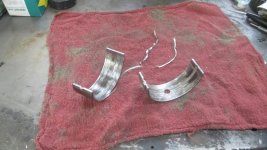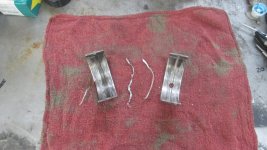toobroketoretire
Banned
Up until this last summer I had been using Valvoline 10W30 conventional oil but when I found I could buy full synthetic Parts Master 10W30 for almost the same cost I made the switch. When I got home with my new oil I ran a test using a small quantity of conventional oil and the new synthetic oil. I put an old 12" aluminum skillet on my stove and put a cap full of each oil on opposite sides of the skillet and turned the burner on HIGH. After several minutes the conventional oil began smoking but the synthetic didn't smoke at all. After about 10 minutes smoke was billowing off the conventional oil but the synthetic still wasn't smoking. After about 15 minutes the conventional oil was turning to ash but the synthetic was barely smoking so I found the synthetic oil can resist heat a LOT better. After I put the synthetic in my 454" engine I noticed it stayed clear for a very long time which indicates the synthetic oil wasn't getting coked from the heat of combustion like the conventional oil always did. So I'm hooked and will run synthetic oil from now on.







